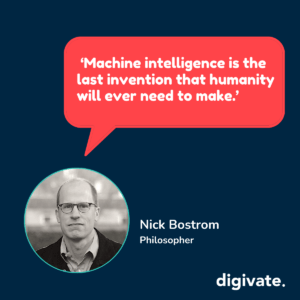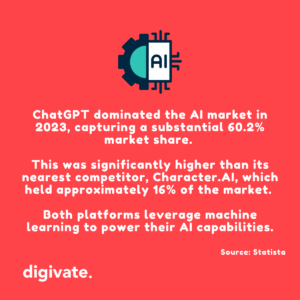
For businesses today, being able to anticipate customer behaviour is key to growth.
With all the buzz around Big Data, Artificial Intelligence, and Machine Learning (ML), we probably all have a basic understanding of what they are.
But:
Do you know what business-related problems Machine Learning can solve, or the value it can add to your business?
In this article, we’ll explore how Machine Learning can help companies improve their marketing efforts.
What is Machine Learning?
Machine Learning (ML) is a subset of Artificial Intelligence wherein a system or machine teaches itself to find better solutions to a task by emulating human intelligence.
In order to carry out effective machine learning, a system needs ample data to learn from and past experiences it can emulate. So, you need both a lot of time and a large amount of data sets.
3 main types of machine learning:
- Supervised Learning: The algorithm is trained on labelled data, meaning the desired output is provided for each input.
- Unsupervised Learning: The algorithm learns patterns from unlabeled data without explicit guidance.
- Reinforcement Learning: The algorithm learns by interacting with an environment and receiving rewards or penalties for its actions.

Machine Learning is typically used in conjunction with Big Data. Big Data refers to extremely large and complex datasets that are too large for traditional data processing application software to handle. These datasets are characterised by their volume, velocity, and variety.
Machine Learning vs. Artificial Intelligence vs. Big Data
| Feature | Machine Learning | Artificial Intelligence | Big Data |
| Definition | A subset of AI that allows systems to learn and improve from experience without being explicitly programmed. | The broader field of computer science focused on creating intelligent agents, simulating human thought processes. | Extremely large data sets that may be analysed computationally to reveal patterns, trends, and associations. |
| Focus | Developing algorithms that can learn from data. | Creating intelligent systems capable of reasoning, learning, and problem-solving. | Storing, managing, and processing large volumes of data. |
| Examples | Recommendation systems, image recognition, fraud detection. | Virtual assistants, self-driving cars, medical diagnosis. | Social media data, financial transactions, scientific data. |
| Challenges | Data quality, overfitting, interpretability. | Achieving human-level intelligence, ethical considerations. | Data storage, processing power, data privacy. |
What are the General Advantages of Machine Learning?
There are many advantages of Machine Learning, many of which have not been fully explored yet.
Generally speaking, effective machine learning makes automation more reliable and widely used, thus saving human effort and resources.
In marketing, Machine Learning can elevate a brand’s marketing efforts even on a small budget.
It can also help to execute marketing campaigns without needing a large team.
Most importantly, Machine Learning can enable a marketer to focus their brainpower and creativity on growth and innovation while the system capable of machine learning can take care of trivial, repetitive tasks.
Some examples of the things Machine Learning can provide are quick and efficient customer service, audience personalisation, better marketing automation, and optimised advertising.
What are the Benefits & Use Cases of Machine Learning in Digital Marketing?
Machine Learning has many applications in digital marketing.
It can be used in the following digital marketing channels: content marketing, content management, social media, PPC, SEO, link building, and chatbots.
Let’s look into all of these channels in more detail:
How is Machine Learning Used in Content Marketing?
You can only use content to generate interest in your products or services if your content is relevant and helpful to the target audience.
Content marketing and creation involves processes like conducting keyword research, following SEO best practices, and tracking consumer trends.
Machine Learning tools can simplify these processes by analysing large amounts of data in a short time period and generating actionable insights. It’s best to compare and research tools before leveraging them in your strategy. AI directories like Appscribed can help you compare options and find tools that are most suitable for your needs.
For example, the CliClap tool provides personalised content recommendations to website visitors, thereby making it more likely for a visitor to turn into a potential buyer or lead. Then there’s also the more well-known content creation tool, ChatGPT which uses machine learning to learn patterns from data and generate human-like text.

How is Machine Learning Used in Content Management?
Mere lead generation via content marketing is not enough.
You also need to keep your audience engaged throughout every stage of the buyer’s journey, satisfy existing customers, and raise brand awareness.
You can use attribution models to prove the value of your content at all buyer stages and to ultimately, increase your ROI.
Trying to manage it all can be very time-consuming – especially if you want to grow your business and scale your marketing quicker.
With the help of ML tools, content management is effective even if it is implemented by a small team.
How is Machine Learning Used in Social Media?
Machine Learning consulting has the power to enhance social media marketing – something we need in today’s age of short attention spans.
Machine Learning tools can help you target people who need or want what you are selling. They let you know the opinions, questions, and requirements of your social media audience by analysing their social media comments and likes.
Given that social media posts are dynamic and ever-growing in nature, there is a real need to utilise Machine Learning in marketing today.
How is Machine Learning Used in PPC?
Machine Learning supercharges pay-per-click advertising (PPC).
The right tools can save you from the tedious task of manually analysing data sets to measure and forecast the performance of your PPC campaigns.
Using the right tools can automatically give you relevant information like sales, conversions, price optimisation, and micro-moment marketing.
Thus, your PPC campaigns can be more effective with significantly less effort.
How is Machine Learning Used in SEO?
If your great content doesn’t rank on Search Engine Result Pages (SERPs) and you don’t have an advertising budget to promote it, it is virtually invisible.
To make your content more visible on search engines, you need to target high-volume keywords that are easy to rank – that’s where search engine optimisation (SEO) comes in.
Machine Learning tools can help you automate keyword research by analysing your SEO competitors.
It can also find competitor content gaps, areas of content improvements, and link-building opportunities.
How is Machine Learning Used in Chatbot Marketing?
AI chatbots are becoming increasingly popular, and for a good reason – they help to provide reliable and pocket-friendly 24/7 customer support.
The best part?
Your customers get the best user experience because chatbots use Natural Language Processing (NLP). NLP enables chatbots to correctly process what the customer is typing and have a natural conversation with them.
The more often a chatbot is used, the better it gets at meeting and even exceeding user expectations.

Finishing Thoughts
Machine learning is no longer a futuristic concept; it’s a practical tool that can dramatically enhance marketing strategies. By harnessing the power of data, businesses can gain invaluable insights into customer behaviour, optimise campaigns, and drive growth.
To sum it up, the key benefits of machine learning in marketing are:
- Improved data analysis: Machine Learning can process vast amounts of data rapidly, uncovering hidden patterns and trends that would be difficult for humans to identify.
- Enhanced efficiency: Automation of routine tasks like keyword research, content optimisation, and ad bidding frees up marketers to focus on strategic initiatives.
- Personalised customer experiences: By analysing customer behaviour and preferences, Machine Learning enables tailored content, product recommendations, and marketing messages.
- Optimised marketing campaigns: Machine Learning algorithms can predict campaign performance, identify high-performing channels, and allocate budgets effectively.
- Increased ROI: Through data-driven decision-making and improved campaign performance, Machine Learning ultimately drives higher return on investment.
- Better customer understanding: By analysing customer interactions and feedback, Machine Learning provides valuable insights into customer needs and preferences.
- Competitive advantage: Early adoption of Machine Learning can give businesses a significant edge over competitors.
Remember, the key to success lies in understanding your business objectives and selecting the right machine-learning tools to achieve them. As technology continues to evolve, so too will the possibilities for leveraging machine learning to drive marketing excellence.



